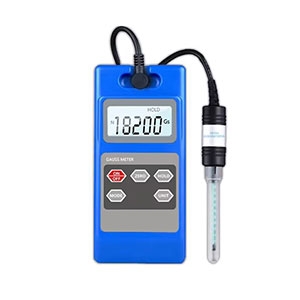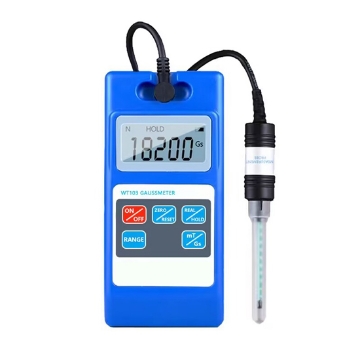Electromagnetic Field Detectors
Digital Electromagnetic Field Detector for Home
Handheld Digital Magnetic Field Meter
Hand-held Electromagnetic Field Reader with Data Lock
Handheld LCD Electromagnetic Field Radiation Detector
High Precision Digital Gauss Meter with Probe
Portable Electromagnetic Field Reader for Home, Office and Outdoor
Portable High Accuracy DC/AC EMF Guass Meter
Handheld Electromagnetic Radiation Tester
Electromagnetic field detector (also known as gaussmeter) is an instrument for measuring magnetic induction intensity based on the Hall effect principle. It consists of a Hall probe and a measuring instrument. The Hall probe generates Hall voltage due to the Hall effect in a magnetic field. After measuring the Hall voltage, the magnitude of the magnetic induction intensity can be determined based on the Hall voltage formula and the known Hall coefficient. The reading of the electromagnetic field detector is in Gauss or Kilogauss.
Principle of Electromagnetic Field Detector
The working principle of the gauss meter is based on the electromagnetic induction method, which uses the induced electromotive force of the conductor magnetic flux to measure and determine the strength of the magnetic field. Specifically, the Tesla meter moves the detector in the measurement area, measures the change in the detector's induced magnetic flux density in the longitudinal and transverse directions, and records it.
Design of EMF Detector
Electromagnetic field detector usually consists of two parts: a detector and a display. The detector is an induction coil placed in the measurement area, while the display is a digital electronic oscilloscope that displays the measurement results.
When designing an electromagnetic field detector, some key factors need to be considered, such as the shape, size and material of the induction coil. These factors determine the measurement range, accuracy and sensitivity of the emf detector.
Applications of Magnetic Field Detector
- Scientific research: Electromagnetic field readers can be applied to scientific research fields such as object shape analysis and surface defect detection. For example, in materials science, emf reader can measure the electric field distribution on the surface of materials and then analyze the structure and properties of the materials.
- Engineering measurement: Electromagnetic field detector has important applications in engineering measurement. For example, in construction engineering, Electromagnetic field tester can be used to measure the electric field distribution on the surface of a building, thereby evaluating the structural stability of the building .
- Geographical surveying and mapping: Electromagnetic field detector can be used for topographic measurement in geographical surveying and mapping. By measuring the distribution of the electric field on the surface, a topographic map can be drawn, and the terrain characteristics and geological structure can be further analyzed .
Advantages of EMF Field Detector
- High precision : Since the electromagnetic induction method is used to measure the magnetic field strength, the measurement results of the Electromagnetic field detector have high precision.
- Wide measurement range : Electromagnetic field reader can measure magnetic field changes in a large range and can be applied to measurement needs in different fields.
- Easy to use : The electromagnetic field detector is simple in design and easy to operate, and does not require much professional knowledge to use.
- Strong scalability : Electromagnetic field detector can improve the measurement accuracy and sensitivity by increasing the number of induction coils .
Notes for Using Electromagnetic Field Detector
- Before using the EMF meter, you need to calibrate it to ensure the accuracy of the measurement results.
- During the measurement process, due to the high sensitivity of the induction coil, it is necessary to pay attention to whether there are other electronic devices around the measuring instrument causing interference.
- The electromagnetic field detector needs to be kept dry and clean during transportation and use to prevent the induction coil from being damaged .
- When using the electromagnetic field detector, you need to pay attention to whether the battery power is sufficient to avoid affecting the accuracy of the measurement results.
In conclusion, emf detector is an important instrument for measuring magnetic field strength. Its working principle is based on the inductive characteristics of magnetic field sensing elements and Gauss's law. In practical applications, calibration and correction are required to improve the accuracy of measurement, and the effect of frequency on measurement must also be considered . By properly selecting and using electromagnetic field detector, magnetic field strength can be effectively measured and analyzed. Choose your ideal EMF reader at sisco.com!









